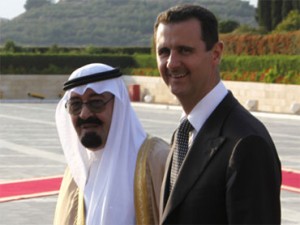 Syria’s ties to Iran, the political void in Iraq and the tensions in Lebanon over the U.N.-backed tribunal.are expected to figure in talks on Sunday when Saudi Arabia’s King Abdullah meets Syrian President Bashar al-Assad, analysts and diplomats said.
Syria’s ties to Iran, the political void in Iraq and the tensions in Lebanon over the U.N.-backed tribunal.are expected to figure in talks on Sunday when Saudi Arabia’s King Abdullah meets Syrian President Bashar al-Assad, analysts and diplomats said.
Announced in Saudi official media, Assad’s second trip to the world’s top oil exporter this year is the latest sign of a thaw in bilateral relations.
The meeting comes days after a state visit to Lebanon last week by President Mahmoud Ahmadinejad of Iran, whose nuclear energy program Riyadh fears could lead to Iran becoming a nuclear-weapons state.
Riyadh has been trying to convince Syria to loosen its alliance with Iran and adopt a more Arab-focused foreign policy with the kingdom, hinting at stronger economic cooperation.
The 2005 killing of Lebanese statesman Rafik al-Hariri drove a wedge between Saudi Arabia and Syria but both countries have been trying to calm tensions over the tribunal which may indict members of Hezbollah, Iran’s main ally in Lebanon.
“I think the main theme will be Lebanon,” Saudi political analyst Khaled al-Dakhil said.
Saudi newspapers gave wide coverage to Ahmadinejad’s visit to Lebanon last week.
Saudi-owned daily Asharq al-Awsat said: “Iran had decided to operate in Lebanon openly rather than from behind a smokescreen.”
Assad and Abdullah visited Lebanon together in July to avert a crisis between Hezbollah, also backed by Syria, and factions aligned to Prime Minister Saad al-Hariri, who is the son of the slain Sunni Muslim leader and is backed by Riyadh.
Hezbollah, which is part of the national unity government, has denounced the U.N.-backed court as a tool of U.S. and Israeli policy and called on Hariri to repudiate the tribunal.
While Saudi Arabia and Syria try to calm tensions in Lebanon they so far remain at odds over the tribunal. Riyadh has long supported the Hague-based court.
Syria, initially implicated by U.N. investigators of the bombing that killed Hariri, always has viewed the tribunal as politically motivated. Syrian officials say any indictments of Hezbollah would be considered as targeting Syria too.
The Saudis might ask Assad to restrain Hezbollah, Dubai political analyst Theodore Karasik said.
“Keeping a lid on Lebanon’s political factions is especially critical in the current security environment,” he said.
Hezbollah leader Sayyed Hassan Nasrallah said in July that Hariri had told him the tribunal would indict “rogue” members of the Shi’ite guerrilla group for his father’s killing.
Saudi Arabia, a U.S. ally alarmed by Iran’s growing regional influence since the 2003 Iraq war, has tried for two years to persuade Damascus to loosen its alliance with Iran.
But little has emerged on the ground in terms of economic cooperation since King Abdullah visited Syria in a landmark visit last year. Some Saudi firms have put out feelers to Syria.
In April, a private Saudi waste-water company was granted contracts worth around $3 million.
“I don’t think that economic relations will take off much any time soon,” a Western diplomat in Riyadh said.
Dakhil said Assad and Abdullah also could discuss the political vacuum in Iraq after an inconclusive vote in March, fueling concerns that insurgents might exploit the void.
“In Iraq the differences between Saudis and Syrians are much less than in Lebanon,” Dakhil said. Reuters

Leave a Reply
You must be logged in to post a comment.